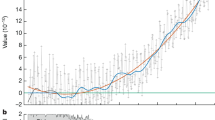Abstract
IN his review of Bergson's new book (NATURE, October 14) Prof. Wildon Carr refers to “Einstein's paradox,” which he quotes in inverted commas as follows:—“Suppose a traveller to be enclosed in a cannon-ball and projected from the earth with a velocity amounting to a twenty-thousandth of the velocity of light; suppose him to meet a star and be returned to earth; he will find when he leaves the cannon-ball that if he has been absent two years, the world in his absence has aged two hundred years.” It so happens that a paradox of this identical kind was proposed to Einstein himself by M. Painlevé at the Paris conferences in April of this year. Unless I have greatly misunderstood Einstein's reply, as recorded by M. Nordmann in the Revue des Deux Mondes of May 1, this particular paradox, arising from the imaginary departure and return of an observer travelling with great speed from a given point and back again, was shown to be one not legitimately derivable from the restricted theory—the theoretical construction is not one to which the transformation formulæ can properly be applied (PP. 146–152).
This is a preview of subscription content, access via your institution
Access options
Subscribe to this journal
Receive 51 print issues and online access
$199.00 per year
only $3.90 per issue
Buy this article
- Purchase on Springer Link
- Instant access to full article PDF
Prices may be subject to local taxes which are calculated during checkout
Similar content being viewed by others
Author information
Authors and Affiliations
Rights and permissions
About this article
Cite this article
BROWNE, H. Einstein's Paradox. Nature 110, 668–669 (1922). https://doi.org/10.1038/110668d0
Issue Date:
DOI: https://doi.org/10.1038/110668d0
Comments
By submitting a comment you agree to abide by our Terms and Community Guidelines. If you find something abusive or that does not comply with our terms or guidelines please flag it as inappropriate.



